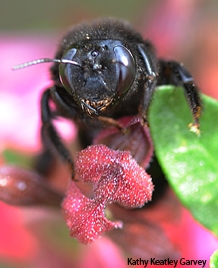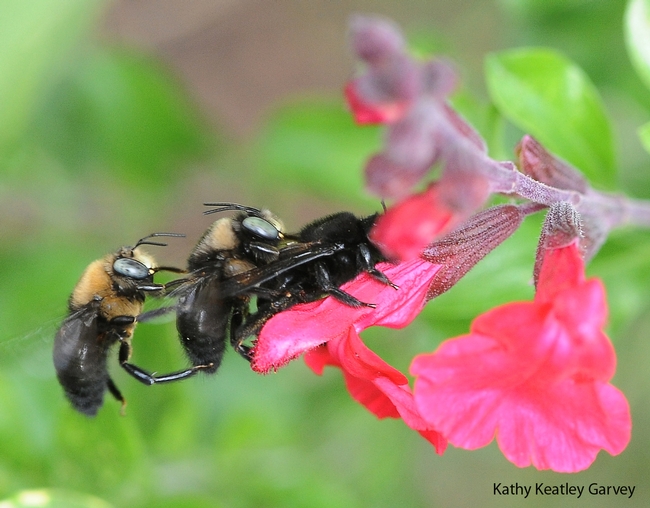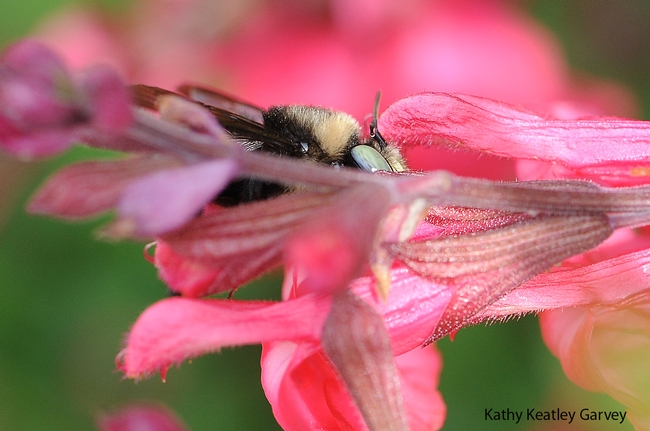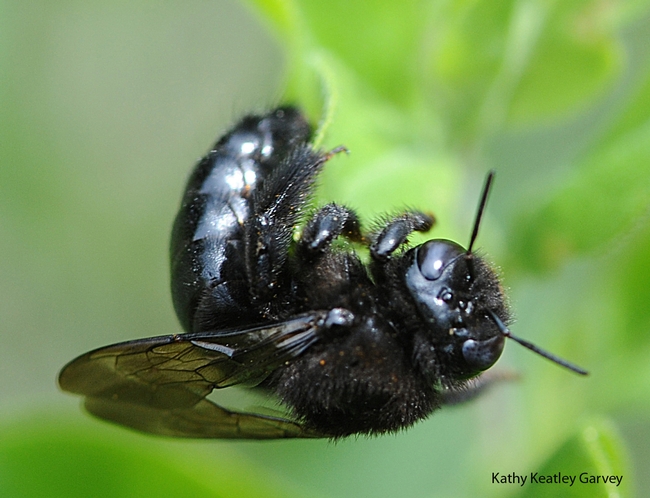
The carpenter bees (Xylocopa tabaniformis orpifex) of the Central Valley have emerged and are creating their own little Lovers' Lane on the salvia.
More males than females. More buzzing than foraging. More chasing than capturing.
This is the "bug" that some folks are afraid of--they describe them as "big black bees heading right at me and scarin' the livin' daylights of me--close enough for a buzz cut."
Well, the males ARE quite territorial. But only the females are solid black. The males have yellow on their thorax and head.
But hey, they shouldn't scare the livin' daylights out of you. They're pollinators.
It's good to know your floral visitors. Not all floral visitors are honey bees. Some are carpenter bees, bumble bees, wool carder bees, longhorned bees, and leafcutting bees, to name a few. Some are syrphid flies that mimic bees and wasps.
If you're yearning to learn more about pollinators, then the all-day Pollinator Gardening workshop on Saturday, April 28 in Room 1001 of Giedt Hall, UC Davis, is for you. "Your Sustainable Backyard: Pollinator Gardening" is sponsored by the California Center for Urban Horticulture (CCUH) at UC Davis. Among the speakers: native pollinator specialist Robbin Thorp, emeritus professor of entomology at UC Davis, who will discuss "Bees 101: Species Diversity and Behavior." Yes, that will include carpenter bees.
Thorp's knowledge of all things bees is totally amazing. You'll come away wanting to spread the word: carpenter bees are pollinators, too. Don't fear them.
Other speakers:
Pollination ecologist Neal Williams, assistant professor of entomology at UC Davis, will share the "Importance of Pollinators and Conservation." Ellen Zagory, director of horticulture at the UC Davis Arboretum, will cover "Bee Plants." Vicki Wojcik, associate program manager of Pollinator Partnership, will speak on "Pollinator Gardening: Design and Maintenance."
You'll "learn about bees and what they do, and how gardeners can support healthy populations through simple gardening practices," said coordinator Melissa "Missy" Gable, horticulturist and program director of CCUH. "This workshop is intended for anyone with a love of gardening."
"We have entomologists, horticulturists and design experts presenting at Pollinator Gardening," Gable said. "This workshop is designed both to inspire gardeners and equip them with all the necessary tools to provision pollinating insects in their own landscape. Without the pollination services of European honey bees and native bees, what fruits and vegetables would be accessible to us? Come learn what you can do your part to support healthy bee communities." Check out the registration site.
Following the workshop, participants can visit (1) the Häagen-Dazs Honey Bee Haven, a half-acre bee friendly garden next to the Harry H. Laidlaw Jr. Honey Bee Research Facility on Bee Biology Road and (2) the UC Davis Arboretum Teaching Nursery on Garrod Drive and perhaps buy a plant or two. The haven is open all year around from dawn to dusk (free admission) while the teaching nursery will be open that afternoon to registered participants for a look-see at the demonstration gardens and for plant sales.
Perhaps, just perhaps, you might want to buy salvia to attract such floral visitors as carpenter bees!
Attached Images:

Two male carpenter bees, Xylocopa tabaniformis orpifex, with a female on salvia. (Photo by Kathy Keatley Garvey)

Peek-a-bee: A male carpenter bee, Xylocopa tabaniformis orpifex, peeking through salvia. (Photo by Kathy Keatley Garvey)

Close-up of female carpenter bee, Xylocopa tabaniformis orpifex. (Photo by Kathy Keatley Garvey)